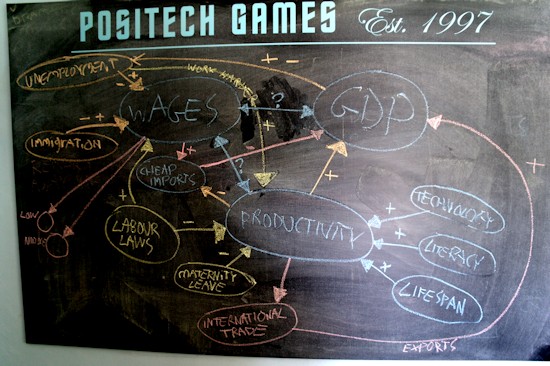So I think you can probably see the problem here right…

Behold my cutting edge game design tools!. Anyway, I got annoyed that ‘wasteful economy’ in Democracy 2 was pretty nebulous, and tried to fix it for the sequel, and realized I probably needed a measurement of wages for that, and then tried to avoid adding ‘competitiveness’ or ‘exports’ because frankly its complex enough as it is…
Generally I’m pleased with most of this,(BTW the bottom left circles are low and middle incomes), but I hav2 big phat question marks, namely
1) How does wages affect GDP and vice versa
2) how does productivity affect wages and vice versa
Can I fix this WITHOUT adding new variables? Do I really need wages? my plan is to be able to add a new item of ‘uncompetitive economy’ which is basically just an extreme example of low productivity. Essentially, we are paid too much and achieve too little (Italy! ahahahaha hahah ahah…). How does this fit in? Basically labour laws (restrictive practices) will keep wages high despite low productivity. Is that really possible? if so, maybe the combination of high wages and low productivity will reduce GDP (implicit hidden factor of reduced competitiveness). maybe low wages could be another positive input into international trade, or perhaps I *do* need competitiveness and have both cheap imports and international trade (re:exports) keyed from it? with wages pushing competitiveness down and productivity pushing it up?
ARGHHHHHHH!